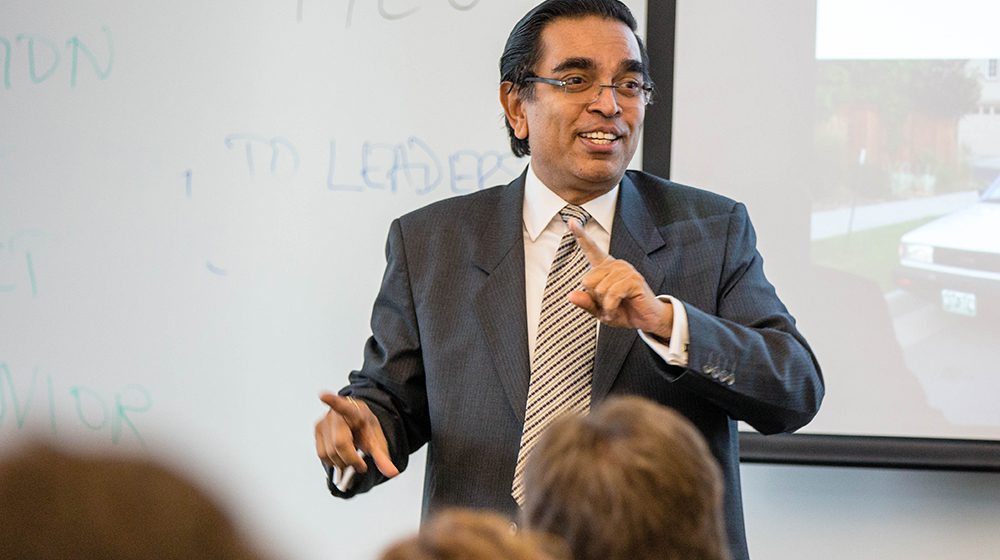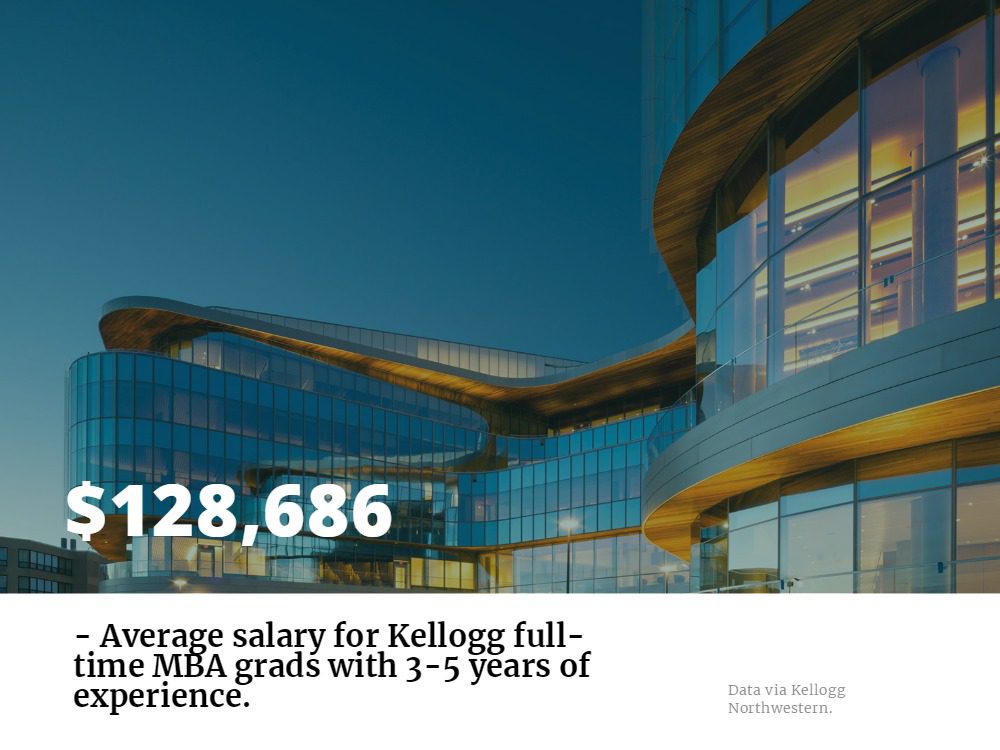From Disney to Starbucks, and More – Chicago News

Let’s explore some of the most interesting stories that have emerged from Chicago business schools this week.
Don’t Let Complacency Derail Your Career – Kellogg Insights
Carter Cast, the Northwestern Kellogg Clinical Professor of Innovation and Entrepreneurship and author of “The Right (and Wrong) Stuff: How Brilliant Careers Are Made — and Unmade,” writes about how “Version 1.0” employees who “lack curiosity and avoid taking risks” may find themselves professionally derailed.
“You have to find ways to stay fresh, especially in this day and age with the massive rate of change in technology. Disruption is everywhere.”
-
- Following a promotion, understand your supervisor’s expectations. “Ask the boss: ‘With this new job, what will I have done in two years to make you think that this was a good move to promote me? What are the key success metrics I should be aiming for?’”
- Increase your learning agility, or how quickly you develop and apply new skills by honing a discovery mindset. “[Force] yourself to acquire new skills that could help you down the road. If you work in sales, for example, you might take time to understand how the marketing team leverages its social marketing assets.”
- Identify your particular “area of innate resistance,” which Cast believes can stifle career growth if not addressed. He advises to spend more time being open to what you could learn than spending time and energy on what you already know.
- Cast advises Version 1.0 types to “adopt the ‘lean thinking’ mentality in order to refresh their thinking and test new ideas.”
- Networks that individuals can “rely on for information and assistance” are critical when jobs are constantly in flux. According to the article, “A strong, diverse network can help you bounce back after a challenge or shake-up.”
You can read more from the article here.
From Disney to Starbucks, Shewalter Doesn’t Shy Away From Big Challenges – Gies College of Business News
The U. Illinois Gies College of Business recently profiled Erik Shewalter (BADM ’14) who offers insights from his transition from Disney’s DTC streaming service to product management role at the Starbucks Rewards Innovation Team where he oversees strategy and innovation.
Shewalter spoke at length about a defining moment from his “once-in-a-lifetime” opportunity at the Disney-branded streaming service where he realized how much he loved the work he was doing.
“One of the defining moments of my career will forever be one of my first meetings with Kevin Mayer (Chairman of Direct-to-Consumer and International). I came to the meeting prepared, and because I was so immersed in the data, I was able to share specific insights that influenced decisions like the choice to include Star Wars and Marvel content in the streaming service.”
One major reason Shewalter left Disney for Starbucks was to work alongside his fiancée Naomi Liu (FIN, BADM ’15) who works in food innovation.
“There are so many little perks that materialize every day, such as sharing a commute, or even sharing our networks (which is critical for succeeding at Starbucks). Also, we love to surprise each other by bringing the other person drinks and snacks throughout the day.”
Check out the entire Gies College of Business News interview here.
Rogers Park and Edgewater Businesses Becoming More Sustainable with Loyola’s Help – Quinlan School of Business
With the support of Loyola University’s Quinlan School of Business Experiential Learning Communities in Solidarity program, professor Nancy Landrum orchestrated partnerships with Smack Dab Chicago and Edge of Sweetness Bakery for her Sustainable Business Management class.
Teams from Landrum’s class “performed waste, water, and simple energy audits and completed greenhouse gas inventories” and then organized “cash mob” events to attract customers to the businesses.
According to the article, “Edge of Sweetness saw a 216 [percent] increase in sales during the cash mob, and Smack Dab Chicago saw a 51 [percent] increase.”
Edge of Sweetness co-owner Kate Merrill (BSN ’96) writes, “I was delighted and surprised by how thorough they were during the initial evaluation. They were also very proactive about what they wanted to do with the projects, which was very nice to see.”
Smack Dab Chicago co-founder Axel Erkenswick adds, “I was interested to see how in-depth the students went into their audits, including going through our waste. Energy conservation is important to me, because it shows customers that we are more than a McDonald’s. We are community driven and put our efforts into helping the environment.”
Read more about the Quinlan program here.
Chicago Booth Predicts The Workplace of the Future, and More – Chicago News

Let’s explore some of the most interesting stories that have emerged from Chicago business schools this week.
What Will Your Workplace Look Like in 2028? – Chicago Booth Magazine
The University of Chicago Booth School of Business interviewed three of its own homegrown experts to help us understand the potential evolution of the office in the next 10 years. Booth assistant professor of economics Jonathan Dingel believes that place is key. He elaborates: “People are not moving to remote rural areas and using Skype to hold their office meetings. Technologies like this have been around for the last couple of decades, but in fact we are seeing people concentrating in particular cities.”
TandemSpring cofounder Tomer Yogev, ’10, writes that, “the traditional path to the top is changing” for the better.
“In the next decade, there’s going to be an even bigger shift into telecommuting and freelancing roles. Larger organizations will need to find new ways to retain talent who no longer want to have traditional desk jobs. There will be more turnover as people look for more appealing opportunities. And getting fired will not be the death sentence that it used to be,” Yogev says.
Cayse Llorens, Booth Evening MBA student and senior associate at Invest Detroit Ventures, thinks that tomorrow’s workers will grow more “adept at working with artificial intelligence–enabled tools and agents that will increase the value of human skills.”
Read more about Booth’s predictions here.
How Businesses Can Best Use Content Marketing to Generate Leads – Kellogg Insights
Northwestern University Kellogg School of Management professor of marketing Bobby Calder, along with researchers from Medill’s Spiegel Research Center, recently published new research that finds that among B2B companies, “digital offerings like webinars, white papers, and branded blogs are valuable tools that result in more leads and, ultimately, more sales than in-person content-marketing events, such as conferences, workshops, and roundtable discussions.” Calder explains:
“These kinds of digital offerings are really important, right up there with sales contacts. Not only does a digital-content-marketing effort really work in the B2B environment, it offers an opportunity for sales and marketing to come closer together and even integrate their approaches.”
Read more about their research here.
CEOs Gather at Loyola to Discuss Leading for Good – Quinlan School of Business
The Loyola University’s Quinlan School of Business Baumhart Center for Social Enterprise and Responsibility recently hosted the Leading for Good conference in which 45 CEOs and top executives from Colombia, UK, and the U.S. “discussed how to integrate business strategy and social purpose to advance the greater good.
According to the article, “three key themes dominated the conference’s three plenary panels and six breakout sessions.”
- The boundaries are blurring
- Cross-sectorial partnerships are vital to accomplishing large-scale goals; and
- “Social business” is on its way to becoming simply ‘business.’”
You can watch highlights and read more about the insights these business leaders shared here.
Northwestern Explores Healthcare Costs, and More – Chicago News

Let’s explore some of the most interesting stories that have emerged from Chicago business schools this week.
When Healthcare Providers Consolidate, Medical Bills Rise – Kellogg Insight
Despite the claim that hospitals make in terms of cost savings when, say, a GP is acquired by a local hospital, Northwestern Kellogg professor of strategy David Dranove, along with research assistant professor strategy Christopher Ody and Bates White Economics Consulting’s Cory Capps sought to research the real financial impacts of integration for instance among healthcare providers.
The researchers found that from 2007 to 2013, almost 10 percent of physician practices in the data were acquired by a hospital. Once acquired, prices for the services provided by those physicians rose an average of 14 percent. “The rising prices are partly due to ‘mechanical elements’ of how prices are set in contracts,” with insurers, Dranove says. For example, insurers often write contracts that allow hospitals to bill more for a procedure than a physician group can. Additionally, Dranove says, “when a hospital owns a physician practice, they gain market power.”
You can learn more about the trio’s research here.
Economics Professor Studies Monetary History of Ecuador – Loyola Quinlan School of Business Blog
Julián P. Díaz, Ph.D., Quinlan School of Business assistant professor of economics, recently presented research on the financial history of Ecuador between 1950-2015 as part of a conference that explored the macroeconomic crises of the 11 largest Latin American countries.

“The Latin American Debt Crisis of the 1980s made this strategy unsustainable since international creditors stopped lending to Ecuador, and the rest of the region. This should have prompted a significant fiscal adjustment, which, however, never really took place in a significant manner. Instead, the government resorted to seigniorage—printing money—to finance a large portion of its spending. This in turn led to a lengthy period—almost three decades— of persistently high inflation, which averaged nearly 30 percent between 1972 and 1999.” – Julián P. Díaz, Ph.D.
“Businesses operate in environments influenced by governments’ actions,” he notes. “Identifying fiscal and monetary policies that lead to undesirable outcomes and hurt the ability of businesses to thrive is of critical importance. For our students, many of the tools used to analyze the countries’ performances in this project are taught in a number of economics classes at Quinlan. This highlights the fact that the topics we cover in class are not just theoretical exercises. They are being used to understand why some countries fail, and what can be done so that such costly experiences are not repeated in the future.
You can check out the full interview with professor Diaz here.
Investing for Social Impact – Chicago Booth Magazine
The University of Chicago Booth School of Business’ Rustandy Center for Social Sector Innovation has become a frontline for investing “with the intention to generate social and environmental impact alongside a financial return” or what has become more commonly known as “impact investing.” Impact investors are a growing segment of managers, consultants, and professionals who seek to blend their financial acumen with “their commitment to improving people’s lives and the health of the planet.”
“Impact investing is just increasing at a faster and faster pace,” Rogers said. “I think it’s a very promising career, and I think the industry will continue to grow as millennials become more socially conscious about how they’re investing their money.”
Read more about the future of impact investing here.
Quinlan Professor Heads to India as new Fulbright Scholar

Arup Varma is taking part in the research project of a lifetime. The professor of management at the Loyola University Quinlan School of Business and recently-named Fulbright Scholar will spend five months in India participating in the prestigious Fulbright exchange.
According to the Quinlan School, Varma will study the performance management of expatriates and develop a model that can be used by multinational companies worldwide as they develop their performance management systems. There is currently no proper model in the academic literature for evaluating expatriates when they are working in other countries.
“I decided to combine two topics of interest to me: performance appraisal and expatriates,” Varma said. “My Ph.D. advisor once told me that the best research topics come out of your personal experiences, and both of these topics are very close to my heart.
Varma will be hosted by the Indian Institute of Management, Lucknow, one of the top business schools in India. While collaborating with faculty and doctoral candidates from Lucknow, he will travel the country and meet with top HR leaders and expatriates to learn how they are evaluated and managed.

Professor Arup Varma/Photo by Heather Eidson.
There is also some altruism behind Varma’s decision to be a Fulbright in India: the Quinlan professor wanted to help his home country in whatever way he could.
“It is clear that academic research in India has started to improve, but is not yet where it should be,” he said. “As I grew up and studied there, the least I can do is pay it back, and help the academic environment there move to the level that it needs to be and play a global leadership role.”
Varma has studied expatriate work issues for the past 15 years, and his research on expatriate issues has been published in notable peer-reviewed journals including the Journal of Managerial Psychology, the International Journal of Human Resource Management, and the European Journal of International Management.
“It is also a great honor as a faculty member and for Loyola. It means we are not just a good teaching school, but we are also a good scholarship school and that continues to be reinforced. I have been very lucky that Quinlan has been very supportive of those of us interested in pursuing research.”
You can read more about Varma’s work and upcoming trip here.
MBA on the Lake: Higher Learning in Chicago & Toronto

To have some type of natural source to balance out the cacophony of city life is crucial to a healthy mind. Not every major city is a concrete jungle, completely broken off from its former natural self or its surroundings. It might surprise city slickers the amount of wilderness opportunities that exist just outside their doorstep.
Take Toronto, for instance. Situated on the shoulder of Lake Ontario, Toronto is surrounded by plateaus, deep forest, ravines, and three rivers. While other Canadian cities may beg to differ, Toronto is the financial and cultural capital of the country. It has long been a hub for migration since the days of the Huron and Iroquois and houses the five largest financial institutions in Canada.
As the heart of American transportation and distribution, Chicago’s metropolitan reputation belies its abundance of natural splendors. Located at the toe of Lake Michigan, the Second City plays host to a wide array of green spaces—arboretums, nature centers, conservatories, and botanical gardens—as well as lakeside walking and biking paths.
Both Chicago and Toronto are world centers for higher education and research, yet offer resplendent surroundings to maintain a balanced state of mind. Both offer much more affordable living situations than New York or San Francisco and are highly underrated for their cultural appeal. Whichever you choose, you will find established, reliable education in your pursuit for the proper MBA. Last month, we analyzed the best part-time offerings in both metros, but let’s take a closer look at the full-time MBA options.
Our Favorite Toronto Full-Time MBA Programs
York University – Schulich School of Business
The Schulich School of Business at York University offers 18 MBA specializations. In addition to full-time programs, the school also accommodate working students with part-time programs that offer both day and evening courses. Students are also able to switch between full and part-time status during their tenure to suit their needs. In 2016, 89 percent of students were hired within three months of graduation by 140 companies. Graduates were employed with an average salary of $91,860 USD and an average signing bonus of $12,050.
McMaster University – DeGroote School of Business
DeGroote School of Business at McMaster University offers full-time and part-time options, as well as a three-year paid work term co-op schedule. Full-time applicants are required to have one year of full-time continuous managerial, professional, or technical work experience (this is where the Co-op plan can come in handy—work as you go). The school offers seven specializations and International study. About 94 percent of recent graduates were employed within six months (over the last two years) with an average starting salary of $71,930 USD.
Western University Canada – Ivey Business School
The Western University Canada Ivey Business School is technically located just outside of Toronto, in London, Ontario. The school offers a full-time program that gives students an opportunity to work with over 200 recruiters, with about 66 percent of graduates finding jobs in Canada. In 2017, 91 percent of the graduating class received a job offer by September 1. Average starting salaries were typically around $90,000 USD with an average signing bonus of $15,000. Other compensations averaged at $9,875.
CHECK THIS OUT: Kings of the North: Should You Get a Part-Time MBA in Chicago or Toronto?
University of Toronto – Rotman School of Management
Students in the Rotman School of Management full-time MBA program are offered 16 major options and more than 90 electives to allow for a very customizable experience. Between 2016 and 2017, 85 percent of full-time Rotman MBA students were employed within six months of graduation and 80 percent landed jobs just within three months. Average starting salaries were $85,000 USD with an average signing bonus of $13,500.
Ryerson University – Ted Rogers School of Management
MBA applicants at the Ted Rogers School of Management at Ryerson University are given two full-time options: the Global MBA or an MBA in the Management of Technology and Innovation (MBA-MTI). Their Global MBA program strives to help their graduates “understand the global context of various industries and have the knowledge necessary to drive innovation and deliver as capable and confident leaders.” The MBA-MTI helps students “gain the skills needed to manage within companies that are focused on tech and innovation.” Last year, about 80.3 percent of graduates found employment within three months of graduation and earned an average starting salary of $89,250 USD.
Our Favorite Chicago Full-Time MBA Programs
Booth School of Business – University of Chicago
The University of Chicago Booth School of Business offers what the school calls the “world’s most flexible MBA program,” and is regarded by U.S. News & World Report as the third best full-time offering in the U.S. The curriculum consists of 20 classes—nine mandatory and 11 courses tailored to personal interest—plus a Leadership Effectiveness and Development (LEAD) program. As of September 2017, an absurd 97.1 percent of graduates reported having received full-time job offers within three months, with 95.3 percent accepted offers in that time. Average starting salaries were an impressive $125,000 with an average starting bonus of $25,000.
Kellogg School of Management – Northwestern University
The Kellogg School of Management at Northwestern University offers two full-time MBA variations, either to be completed in one or two years. The school’s 2017 employment report, which can be downloaded here, detailed that 94.1 percent of graduates received job offers within three months and 90.8 percent of those grads accepted job offers. The average starting salaries for graduates with three-to-five years of work experience was an unsurprisingly lavish $128,686.

Like the Booth School of Business, when comparing Chicago and Toronto programs, financial gain is clearly an advantage for those who elect to study in the U.S. However, perhaps unsurprisingly, schools like Kellogg come with a steeper tuition cost. Applicants for the One Year full-time program should expect to pay more than $133,000 for the entire program, while those in the Rotman School of Management will have to pay around $75,000 USD.
Kellstadt Graduate School of Business – DePaul University
At the DePaul University Kellstadt Graduate School of Business, students can obtain a full-time MBA with the availability of 100 courses in 20 MBA concentrations and 17 specialized Master degrees. In 2016, within six months 89 percent of surveyed graduates were employed, 14 percent being entrepreneurial, contract or freelance. Average starting salaries were about $82,200.
Liautaud Graduate School of Business – University of Illinois at Chicago
The Liautaud Graduate School of Business at the University of Illinois at Chicago full-time MBA is a 13.5 course program, with six courses designed to deepened functional business knowledge, while the remaining 7.5 are geared towards allowing students to customize their experience towards their personal career interests. They provide twelve concentrations in their MBA program.
Mendoza College of Business – Notre Dame
The Mendoza College of Business at Notre Dame University offers two traditional full-time MBA options, which can be taken in two years, or just one in a more accelerated format. According to employment statistics recently released by the business school, about 88 percent of Two-Year full-time students were given a job offer within three months of graduating, with about 86 percent of those graduates accepting the offers. Like many of the major business schools located in the Chicago metro (although, yes, Notre Dame is technically in Indiana), full-time MBA grads enjoyed a lush base salary upon employment, with an average salary of $105,000 for the Class of 2017. Median signing bonuses also ranked in the higher end of the schools on this list, coming in at around $20,000.
The Mendoza College of Business is one of the many business schools in the U.S. that has seen a dramatic shift in terms of graduates moving into the tech industry. Three industries in particular dominated when it came to employing Mendoza MBA grads: tech, financial services, and consulting. However, a slim majority (24.7 percent) joined the tech industry, enjoying salaries slightly higher than the Mendoza average, coming in at $110,000.
Quinlan School of Business – Loyola University
The Quinlan School of Business offers full-time MBA offering is one of the most affordable high-quality Chicago options out there, with the most recent full-cost of the program coming in at $73,422; comparable to many of the aforementioned Toronto programs. And unlike many of the programs on this list, Quinlan isn’t located in some quaint suburb. Rather, the school is centered right on the historic Magnificent Mile in Chicago, fully integrated into the vibrant city.
Gear Up For These January MBA Deadlines

The next round of MBA admissions is swiftly approaching, with the eve of 2018 almost here. Time to mark those calendars!
New York City
The NYU Stern School of Business, Columbia Business School, and Rutgers Business School, Newark/New Brunswick are the big headliners when it comes to deadlines in the New York City metro in January.
The Forham University Gabelli School of Business, and the Syracuse University Whitman School of Management Online MBA program also have deadlines in the first weeks of the new year. Click here for more information on upcoming New York City metro deadlines.

The third round for application deadlines to Cornell’s Tech MBA on its new Roosevelt Island campus arrives January 10, 2018.
Los Angeles
The biggest Los Angeles metro business school institutions all have a slew of deadlines ready to pass within the first weeks of the new year, including the UCLA Anderson School of Management‘s full-time MBA, USC Marshall‘s part-time program, as well as the Claremont University Peter F. Drucker and Masatoshi Ito Graduate School of Management‘s part-time MBA.
Take a look at the coming deadlines in the Los Angeles metro here.
Toronto
Two Toronto metro schools have deadlines in early January, with the Ivey Business School full-time, Accelerated, and EMBA deadlines all falling on January 8, 2018. The second round deadline to the University of Toronto Rotman School of Management‘s full-time MBA also falls on January 8.
Take a look at the coming deadlines in the Toronto metro here.
Chicago
Two of the most prominent business schools in the entire Chicago metro—Chicago Booth and Northwestern Kellogg—feature a bevy of full-time, part-time, and Evening MBA deadlines before January 10. As well, the Quinlan School of Business at Loyola University’s full-time MBA for its annual spring intake arrives on January 15, 2018.
Just outside of the city, on the near border of Indiana, the Notre Dame Mendoza College of Business’ second round deadline for its full-time MBA program is set for January 9.
Get familiar with the coming deadlines in the Chicago metro here.

The second round of deadlines for the Northwestern Kellogg part-time and full-time MBA programs arrives on Jan. 10, 2018.
Boston
In Boston, the heart of America’s higher education, every January is a major month for several of the country’s most prominent MBA programs. Indeed, Harvard Business School and MIT Sloan, as well as the Questrom School of Business at Boston University, the Carroll School of Management at Boston College, and Northeastern University’s D’Amore-McKim School of Business all have MBA deadlines right at the beginning of the new year for various MBA programs.
Take a look at the coming deadlines in the Boston metro here.
For updated deadline information in Philadelphia, Washington DC, Baltimore, Atlanta, Dallas, Houston, Denver, San Francisco, San Diego, Seattle, and London, click here.
